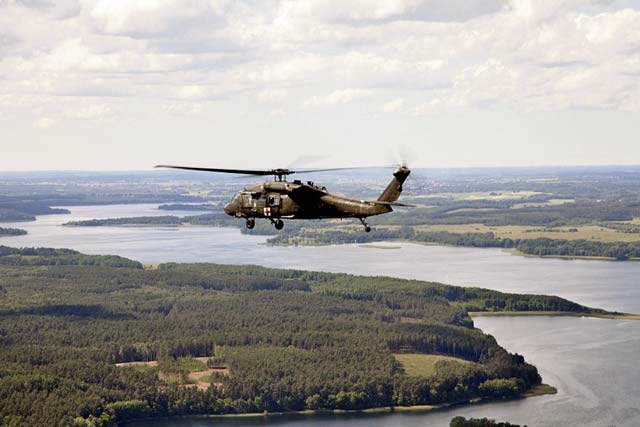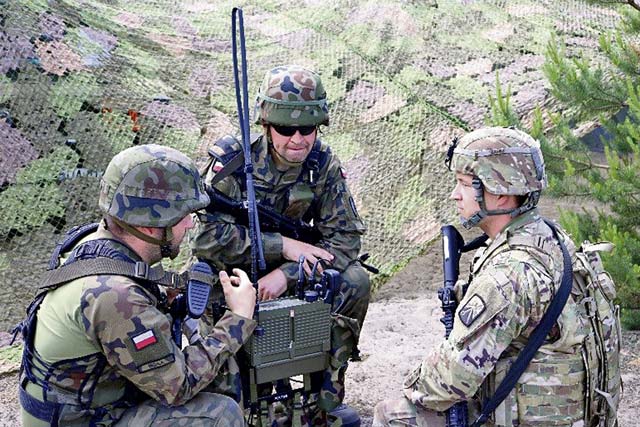
A UH-60 medical evacuation helicopter assigned to Company C., 2nd Battalion, 227th Aviation Regiment, 1st Air Cavalry Brigade responds to a nine-line medevac as part of a mass casualty evacuation drill during exercise Anakonda ’16 June 11 at Drawsko Pomorskie Training Area, Poland. Anakonda ’16, a multinational training event, involves approximately 31,000 participants from more than 20 nations and is a premier training event for U.S. Army Europe.
WARSAW, Poland — Deploying thousands of troops and hundreds of vehicles and pieces of equipment across a dozen locations, the 21st Theater Sustainment Command provided critical sustainment services to exercise Anakonda ’16.
Anakonda ’16 is a U.S.- and Polish-led multinational exercise that featured 31,000 participants from 24 nations and included a seamless integration of U.S.-based rotational forces, U.S.-based reserve forces and European-stationed U.S. Army forces, both active and reserve components.
The 21st TSC deployed elements of the command’s headquarters and three subordinate brigades, the 30th Medical Brigade, 18th Military Police Brigade and the 16th Sustainment Brigade, as well as elements of the 7th Mission Support Command. Each of the three brigades performed separate critical functions for the exercise and conducted cooperative training efforts with partners from other participating nations.
The 30th Med. Bde. provided both real-world and training medical support to multiple events throughout the exercise, including a multinational jump that was part of Swift Response ’16, a related exercise. Additionally, the 30th Med. Bde. organized and oversaw a mass-casualty simulation that brought together the medics of both the active and reserve components of the U.S. Army as well as partner nation medical services. This mass-casualty event helped the participants develop their ability to work across language barriers and other interoperability challenges to provide first-rate emergency medical care in catastrophic situations.
The 18th MP Bde. provided force protection as well as convoy escort for forces moving to and from the exercise, assisting with convoys stretching across multiple locations in Germany and Poland. Working hand in hand with partner military police forces in the Bulgarian army and other participating nations, the 18th MP Bde. was also critical to the execution of a major river crossing and forward passage of lines. These two events not only trained the forces to work well together in such endeavors, but they also served as a signal that the U.S. Army’s focus in Europe is returning to more traditional, decisive action-oriented training.
The 16th Sust. Bde., U.S. Army in Europe’s only sustainment brigade, provided a wide variety of logistics to multiple locations in Poland for the exercise. Deploying long before the official start of the exercise, much of the 16th Sust. Bde.’s efforts revolved around supporting the movement into and out of Poland for more than 10,000 U.S. participants. With movement control teams overseeing the movement of equipment and vehicles and a transportation company providing long distance line haul transportation, the brigade was critical to the successful start of the exercise. Other services provided by the brigade included fuel support, water purification and other life-support and -sustainment functions.
One of the key factors for the 16th Sust. Bde. was the geographical disbursement of forces in the exercise. According to Col. Michelle Letcher, 16th Sust. Bde. commander, this challenged the brigade to maximize its operational reach, or ability to operate across long distances and in geographically remote areas.
“It’s a challenge, but it’s also an opportunity to see how far we can stretch our organization to support our allies,” Letcher said. “Whether you’re pumping fuel, driving a truck or firing a weapon, your goal is to provide stability and security, and that’s what we did.”

Sgt. Joshua Elkins, a nodal network systems operator assigned to the 504th Brigade Signal Company, 16th Special Troops Battalion (right), learns how to use a Polish radio during Anakonda ’16 June 8.
In providing sustainment services to this multinational exercise, the TSC partnered with the 364th Expeditionary Sustainment Command, a U.S.-based reserve unit. The integration of both active-duty European-based forces and U.S.-based reserve components in support of rotational forces served as a validation of sorts for the regionally aligned forces concept USAREUR has moved to in recent years.
“It was the total Army in Europe leading an effort, establishing a baseline for how to do future operations in Europe,” said Brig. Gen. Arlan DeBlieck, who serves not only as the commanding general of the 7th MSC, the U.S. Army’s largest forward-based reserve component unit, but also as the deputy commanding general of the 21st TSC. “All the components were heavily involved and were doing a superb job.”







